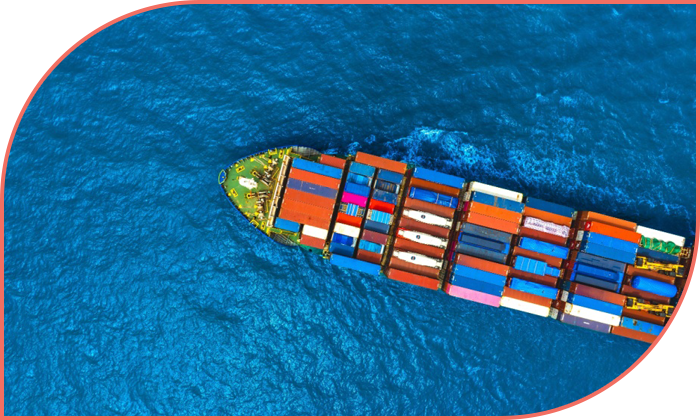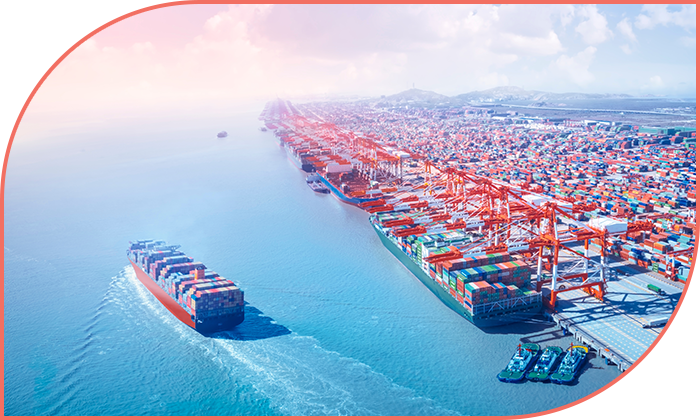Cost and Freight (CFR)
What is the definition of the Cost and Freight?
Under the CFR incoterm, the seller is responsible for arranging the transportation of goods to a designated port.
Their duties include clearing the goods for export, delivering them on board the ship, and covering the cost of freight to transport the goods to the named port of destination. However, the seller's responsibility for the goods ends once they are loaded onto the vessel.
At this point, the risk of loss or damage to the goods transfers to the buyer. The buyer is then responsible for any additional costs incurred from the port onwards, including unloading, import duties, and any further transportation.
It’s important to note that under CFR terms, the seller does not arrange or pay for insurance for the shipment. As a result, the buyer must secure their own insurance to cover any potential risks during the main carriage.
What are the CFR responsibilities for a buyer?
Once the goods are loaded onto the vessel, the buyer has a number of crucial duties:
- Risk transfer (the buyer assumes all risk of loss or damage to the goods once they are loaded onto the vessel at the port of shipment)
- Import clearance (including customs duties, taxes, and compliance with local import regulations)
- Transport costs (including unloading charges and any further transportation to the final delivery location)
- Insurance
- Discharge and onward carriage
What are the CFR responsibilities for a seller?
The cost and freight incoterm deems the seller responsible for the following:
- Export documentation (e.g., the commercial invoice, packing list, and bill of lading)
- Packaging and marking
- Export customs clearance (including handling all customs formalities and obtaining export licences)
- Transportation to port
- Loading charges
- Freight costs (this covers the main carriage but excludes insurance)
Compare Freight Shipping Rates in Seconds
Get instant quotes from leading ocean and air freight providers. Find the best rates for your shipping needs in one place.
When is a Cost and Freight agreement used?
The CFR incoterm, meaning the seller pays export costs, clearance and freight costs, can have advantages for parties in specific situations:
Bulk cargo:
The CFR delivery term is often used for bulk cargo, such as grain, coal, or other large quantities of goods that can be easily loaded directly onto a vessel. The seller has direct access to the vessel for loading, which simplifies the logistics and reduces handling costs.
Seller's expertise in exporting:
When the seller has extensive experience in handling export procedures, arranging transportation, and managing logistics up to the port of destination, the CFR incoterm means they can leverage their expertise.
Non-containerised goods:
When transporting non-containerised goods, the CFR incoterm can be more appropriate: this includes oversized or heavy goods that don’t fit standard shipping containers and require special handling.

What are the benefits of Cost and Freight terms?

Seller responsible for shipping process
The seller takes full responsibility for the shipping process up to the destination port: this includes handling export formalities, arranging for transportation, and making sure the goods are loaded onto the vessel.
By incorporating the shipping costs into the overall sales price, the seller can potentially increase profit margins.
Seller not responsible for damage and costs for cargo on the main carriage
Another advantage of CFR terms is that the seller is not responsible for the cargo once it’s loaded onto the vessel. The risk of loss or damage to the goods transfers to the buyer at this point.
Any incidents occurring during the main carriage, such as damage or delays, don’t impact the seller financially.
Buyer does not have to arrange main carriage
For the buyer, one of the main advantages of the cost and freight incoterm is that they don’t have to arrange the main carriage.
The buyer doesn’t need to manage the complexities of international freight logistics, which can save time and reduce the administrative burden associated with coordinating transport.
The Best Rate For Your Freight
Access real-time quotes from leading freight providers. Choose the best ocean and air shipping option for your business.
What are the drawbacks of Cost and Freight terms?
Buyers more likely to pay higher costs
Under CFR, the seller arranges for the shipping up to the port. However, since the buyer assumes all risks once the goods are loaded onto the vessel, they may incur additional expenses (e.g., insurance and any unforeseen costs that must be paid for during transit).
Higher buyer risk
The risk of loss or damage to the goods transfers from the seller to the buyer as soon as the goods are loaded onto the ship: this means that any issues that arise during the main carriage, such as damage, loss, or delays, are the buyer's responsibility.
Without the seller's obligation to provide insurance, the buyer must ensure they have adequate coverage to mitigate these risks.
Seller likely to pay before
receiving buyer payment
From the seller's perspective, a notable disadvantage of the CFR incoterm is the financial burden of covering transportation costs upfront.
Sellers are required to pay for the freight charges and any related expenses before receiving payment from the buyer, which can affect cash flow (particularly for small to medium-sized enterprises).

CFR Frequently Asked Questions
What’s the difference between CIF and CFR?
Under CFR, the seller is responsible for the cost of transporting goods to the port of destination but does not have to provide insurance.
The buyer must arrange and pay for insurance from the point of loading onwards. Under CIF terms, however, the seller must procure and pay for insurance.
Who will pay the freight in CFR Incoterm?
In cost and freight terms, the seller pays for the freight charges to transport the goods to the named port of destination.
Who pays duties in CFR?
Under CFR (Cost and Freight) terms, the buyer is responsible for paying all duties, taxes, and customs clearance fees at the port of destination.
Get The Best Freight Rates Today
Easily compare rates from top ocean and air freight carriers. Save time and money on your next shipment.